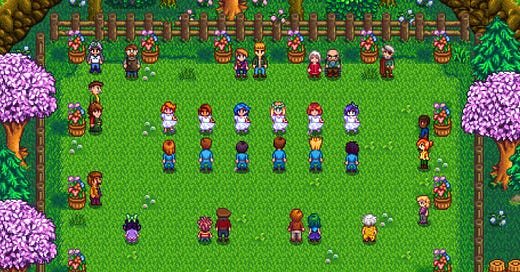The Genius vs The Scenius
Brian Eno once coined a phrase that has since informed how many practice and collaborate within the arts: the Scenius. The basic gyst of the phrase is that, rather than being created by lone geniuses working away at their latest masterpiece, great works of art are the product of a collaborative network of artists and creators, a “Scenius” rather than a genius.
The cult of the auteur selectively celebrates the individuals behind famous works of art rather than looking at the wider forms of collaboration that went into making it. Eno knew about this first-hand — his collaborations with David Bowie on his Berlin albums weren't just limited to the iconic rock star and the legendary producer, they were also the product of collaboration with Bowie’s long-running producer, Tony Visconti, and musicians that are just as much a part of that distinct sound. The Berlin trilogy also continued ideas that were set in motion by Bowie’s collaborative work with Iggy Pop and the Krautrock scene that inspired them.
The idea that great art is a collaborative rather than individualist product has also caught on among those that advocate for artist development and give advice to aspiring creators. Many literary and spoken word development schemes have centred around and encouraged the forming of collectives. Austin Kleon, the writer of some excellent books on encouraging artists to keep creating, characterised the contrast between the creative scene and the lone creator as the Ecosystem vs the Egosystem. It’s easy to see those that create as part of a collective or a scene as mirroring the socialist and communal political movements of our times while adherents to the “lone genius” type could be seen as more of an individualistic Thatcherite.
Then there’s the whole connected and collaborative aspect of today’s digital world, where social networks become our main means of sharing, often relying on like-minded souls to amplify our offerings. Lone wolves tend not to do so well in this environment. The dominant message for artists is to get together or get left behind.
How the idea of the Scenius disenfranchises and discourages the introvert
The genius/scenius dichotomy leaves out one important personality trait: introversion. Every time an introverted artist hears that the best way to enhance and promote their work is through collaboration and socialising, their own means of artistic practice feels that bit more hopeless.
An introvert isn’t necessarily a quiet and shy person, an introvert is simply someone who functions better or their own than they do in the company of others that are not their nearest and dearest. While introverted artists may rely on others to help promote and get feedback on their work, they are at their most creative when they work alone. This isn’t because they are rampant individualists or narcissists, you’ll find plenty of these traits within extroverts too (see the recent documentary about WeWork for an example) . This is simply because, and I say this as an out-and-proud introvert, people drain us and do our effin’ nuts in.
Introverted Creators in the digital age
Luckily, when we look for examples of how the new digital world enables creativity and sharing, it isn’t all bad news. Limmy, the award winning comedian behind Limmy’s Show and Limmy’s Home Made Show, recently announced that he was going to work as a streamer full time. Even his move from Limmy’s Show (a collaborative project that made use of cast, crew and producers) to Limmy’s Homemade Show was a case of going from a large group project to one where Limmy made up the entirety of the cast and crew. The move from Homemade Show to streaming simply cut out another middleman, BBC Scotland in this case, so that he became the sole producer and commissioner of his work. When asked about why he retreated from collaborative work, Limmy was admirably candid about the toll these projects took on his mental health. Blindboy, another streamer for whom I am an unapologetically gushy fanboy, is finding similar success in downsizing from bigger collaborative projects to projects that he can produce entirely on his own. His podcast and live stream were born from his frustration from working on bigger television and radio projects over the years.
Moving away from comedy, music and streaming; video games provide a good example of how an artist’s singular vision can create something new and exciting. While big AAA game studios churn out the same glitzy but bland product (where astonishing visuals and design quickly succumb to the numbing familiarity of uninspired gameplay mechanics), innovation and excitement often come in pixelated form from small indie developers. Eric “ConcernedApe” Barone created an all-time classic, Stardew Valley, entirely on his own (though he hired a small team to help with updates as the game achieved phenomenal success) and spoke of his introversion in an interview with Kotaku in 2016:
I think for me I’ve always been kind of a lonely guy, kind of a hermit. I keep to myself. I don’t really have that many friends, I don’t go out much. I’m an introvert. Art is a way to connect with other people. It’s a way to communicate and for other people to see who I really am. I think everyone wants to feel like they belong or that they can connect with society in some way. This is just my way of doing that.
I think it is worth differentiating, as far as individual creation is concerned, between the introvert and the auteur. The auteur tends to be a phenomenon of when we elevate a figurehead, like a big film director, while ignoring or minimising the work of the hundreds that helped them to bring their project to life. It’s no coincidence that the Best Director category for the Oscars was solely populated by white male nominees for so many consecutive decades.
Whereas the introvert is someone who scales down their collaboration to something manageable, often working alone on a smaller project if they can. They are not necessarily rampant individualists. As Barone states about his work on Stardew Valley: introverts want to share and communicate with others and it is their art, rather than their networking and schmoozing, that is their true means of communication.
If you enjoyed this post and want to receive more of the same in your inbox, click the subscribe button below. Thanks for reading this.










Share this post